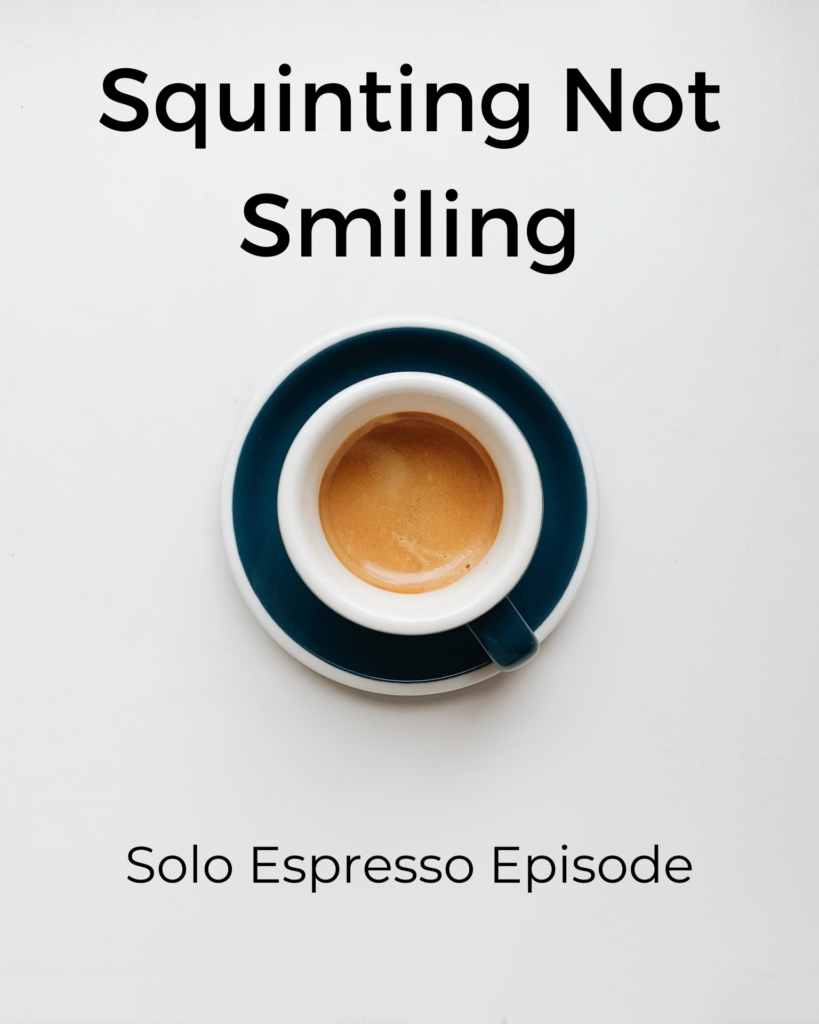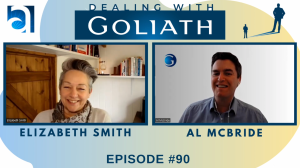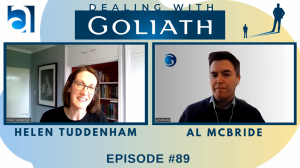Show Notes:
In this solo espresso episode I recall my odd thoughts on sunglasses and how they led me to being accidentally friendly and the reactions I got which set off new appreciations.
Topics touched on:
- Emotional contagion
- Changing yourself to prime the atmosphere
- Run an experiment
- Are you adding value or bringing a room down?
- Which ‘you’ is turning up?
- How would you like to be described?
Transcript
Welcome to dealing with Goliath podcast. This is a solo espresso episode. This one’s called squinting, not smiling. So I was thinking about this when I was walking around there recently. Last year I lived in London and I enjoyed my time in London very much. Some great some really great times there some really great times.But I was walking around this was it we were in the West london and in an area called Ealing, which is known as Queen in the suburbs.
It’s a fabulous place, very surprisingly communal for London. Very surprisingly welcoming, lovely rolling hills and big trees and lots of little parks all over the place and it was very, very pleasant place to live yet still well. Enough connected that you could be in proper central London on the tube and 25 to 30 minutes depending on where you were going, you know.
Anyway, I digress when I moved over there. I was walking around getting climatized to the new neighborhood, you know, so walk around, it’s quite a residential place down in Ealing. It’s not a cheap place. It’s, it’s a lot of Maseratis, you know, I thought of expensive cars and expensive houses and stuff. So we were doing well to live there but anyway, we’re walking I’m walking around. And I notice you know, this is in the summer and things are bright and it’s nice weather and I know most people are very friendly you know, they keep to keep smiling at me.
Well, hello and Hello and welcome anything. I thought Londoners were meant to be really unfriendly and you know, step on your face as look at you type of thing you know, where there’s no engagement and then because big city and everyone’s in a rush and plenty London is like that, but So I was kind of a bit taken aback I was like, this is great people are lovely here. What do you know? Who knew? Right? So I’m walking around Walker and this is going on for days, every time I go to go to get groceries or whatever, I go for a coffee and you know going for a stroll and walking by people who are walking the dog and this kind of thing and, and here they are.
Hello, Hi, how’s it going and all this other stuff? This is going on for us. So a good week or so more. People are very friendly. And then it occurs to me see, I don’t tend to wear sunglasses. I don’t know where this habit came from. I think I think the sunglasses kind of, you know, slot a slide down my nose or something and then you kind of look like some Professor with the glasses down here and you look a bit silly, you know, when the glasses are right down at the tip of your nose. Just looks like an agent and you just keep putting the specs up and they keep falling down. You feel a bit stupid, you know, feel a bit daft. So I tend to avoid wearing sunglasses.
And I read somewhere else that you know, with a lot of sunglasses they stop these sensors in the back of your eye detecting that it’s really bright because seemingly that helps Caucasian people actually protect their skin because it goes Oh, it’s really bright, don’t get burned and it sends those signals now, what difference it makes? I won’t lie to you, I don’t know but Anyway, so I don’t wear sunglasses, so you can see where this is going. So I walking around squinting, first kind of like this the whole time, you know, doing a bit of a Clint Eastwood job, you know, squinting in the sunshine bit. I walk along and I’m happy enough anyway. But I don’t walk around, smiling.
But then I realize everyone thinks I’m smiling, because I’m squinting. Yeah, I was thinking about this because a real smile like a fake smile is like this right where it But the the muscles around the eyes that indicate to people whether it’s a genuine smile or not. But I think when you’re squinting it kind of does lift those little eye muscles, the side of your eyes, lifts them up as if it’s a real smile. While these people are responding as if I’m walking around with a big smile on my face.And the reason it occurred to me, of course was because it was sunny here back in Dublin sunny here last week, and I was walking around and people were smiling and it reminded me of London, you know? And it occurred to me that isn’t that amazing? That if I look my usual, overly Stern, resting pokerface overly serious guy, you know, people don’t tend to smile much.
By accidentally squinting, they thought I was smiling and so they smile and say hello, and they’re friendly. And so they see me then a suppose is some sort of non threatening, pleasant, upbeat, positive Look, you know, which is kind of nice Actually, it was very nice. And you kind of think Alright, maybe I should smile more often find something genuine to smile about, you know, you don’t fake the smile, you know what I mean? You want to have a positive thought. So that said those those you know, tell yourself a joke or, listen to more, watch more Netflix comedy specials and remember some of the great gags in them. Make yourself up and walk around.It’s a nice experiment to do. And that’s what I was doing there last week, walking around.
One day was squinting and other was overcast. So I thought of something funny, you know? And yeah, sure. As dammit there they were smiling away. Hello. How’s it going? Everybody certainly friendly around the neighborhood. Could it be me? Yes, of course. It’s me. I’m the different factor, right. And this is what I remembered what they call emotional contagion. And that’s really the thought for you is First of all, do that experiment, you genuinely walk around smiling a bit more than you might otherwise, see what happens? Let us know send us an email or comment below, it’d be interesting to see if that little experiment actually does anything. And the second thing I just suggest, as I said, is this thing called emotional contagion.
So when you walk into a room, we’ve all been in rooms, right? where someone walks in on their own Grade Form. They’re fantastic. They’re loving life, and everyone is happy to be there, right? The energy literally rises in the room, right or name it. You know, they’re upbeat or they’re chilled or whatever it is. And we also know the opposite, don’t we? We also know you know, the negative side where someone walks in and they’re in horrific mood. They’re in terrible form. And of course, everybody’s like walking on eggshells and but that is emotional contagion.
So I put it to you, if you’re walking into a room with clients, if you’re walking into a room, your colleagues or indeed your spouse to your family or significant other. Not a bad idea if you’re in bad mood to say, Stop. Do I really want to bring this in here? Do we want to infect them? Particularly in these covid times? It’s the same thing. What are we infecting others with? Is it nastiness? Is it grumpiness? is a dour illness? Is this misery? Are we? Are we grumbling and complaining? Are we going in and we’re actually just even just adding the value of being upbeat, being positive. What’s the difference that that will make in that person’s day and that person’s hour.
Now, as I said, this is very big when you’re working in teams when you’re when you’re the boss, who are you bringing at to work with you, which you is turning off on all the more most important when you’re working with clients, because you don’t want to have to sort of apologize for being miserable because think about it a particularly if you’re a pet. You want to put your best foot forward? Of course we all do. But think about who you’re bringing, how would you describe that person? And then talk about how would you ideally like to be described? What are those attributes? Do those attributes make it happen? But first of all, try the little experiment with smiling strangers as you’re walking around. be interested to hear what your results are.Transcribed by https://otter.ai




